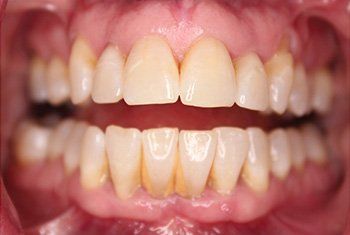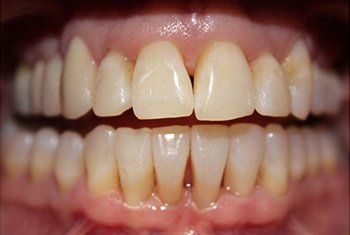Periodontics In Columbia, MD
Limited Time Offer
New Patient Special
$99 Exam and X-Ray on Your First Visit
Smile Savers Dentistry Offers Comprehensive Periodontal Care
Smile Savers Dentistry is dedicated to providing comprehensive periodontal treatment to all of our patients. Our practice, led by Dr. Anuja Patel as our head dentist, offers personalized treatments to combat gum disease and promote gum health. This guide will explore the importance and treatment options for periodontics.
Understanding Periodontics - The Importance Of Gum Health
Periodontics is a branch of dentistry that focuses on the prevention and diagnosis of diseases affecting the supporting structures of teeth including the gums and periodontal ligaments. It also treats the alveolar bones. Healthy gums play a vital role in maintaining your oral health, including your ability to maintain your teeth and their function.
Periodontal disease is also called
gum disease. It is a condition that causes inflammation and infection in the gums. Untreated gum disease can cause irreversible damage, including tooth loss, to the supporting bone and gums. Early detection and treatment are essential for preventing gum disease progression and maintaining your oral health.
Why Choose Smile Savers for Gum Disease Treatment?
If you’re experiencing symptoms of gum disease, schedule a consultation at Smile Savers Dentistry for LANAP laser gum surgery! Our team will take care of your gums and teeth so you can be proud of your beautiful and healthy smile again.
Call us at
(410) 730-6460 to schedule your consultation at our Columbia, MD, dental office today!
Common Signs of Gum Disease
Gum Disease Prevention: Tips for Optimal Gum Health
Preventing gum disease and maintaining healthy gums is all about prevention. Here are a few tips to promote optimal gum health:
Brush and Floss Daily
Brush your teeth twice a day at least with fluoride toothpaste and use floss to remove bacteria and plaque from between teeth and along the gumline.
Regular Dental Checkups
To monitor your periodontal and gum health, schedule regular dental cleanings and check-ups with Dr. Patel at least every six months.
Healthy Lifestyle Habits
Eat a diet that is rich in fruits and vegetables and lean protein. Limit sugary and acidic food and drinks, which can lead to plaque and gum disease. Tobacco use is a major risk factor for gum diseases and other oral problems.
Stay Hydrated
Drink lots of water to keep your mouth moist, hydrated, and free from bacteria.
Manage Stress
Chronic anxiety can weaken your immune system and increase your risk of gum disease. Exercise, meditation, or relaxation techniques can help you reduce stress and improve your health.
Don't Miss Out on Our Limited Time Offer
New Patient Special
$99 Exam and X-Ray on Your First Visit
Book your Periodontal Consultation Now
Do not wait to get treatment if you are experiencing gum disease symptoms or if your periodontal health needs an evaluation. Let us help you maintain and achieve optimal gum health by scheduling a consultation at Smile Savers Dentistry with Dr. Patel. Call us to schedule your appointment today and start the journey toward a happier, healthier smile.
Smile Savers Dentistry Offers Advanced Periodontal Treatments
We offer a wide range of periodontal treatment options to treat gum disease and improve gum health. Our advanced treatments include:
Scaling and Root Planning
Also known as deep cleaning or scaling and root planning, this non-surgical treatment is designed to remove plaque and tartar from the surface of the teeth, below the gum line, and bacteria toxins. This treatment reduces inflammation and helps to eliminate bacteria, which allows the gums and teeth to heal.
Gum Grafting
Gum grafting involves a surgical procedure to replace gum tissue that has been lost to injury or recession. During this procedure, Dr. Patel takes tissue from the palate (or another source) and transplants it into the areas of recession to protect and augment the exposed roots.
Pocket Reduction Surgery
In advanced cases of periodontitis it may be necessary to perform pocket reduction surgery to remove the deep pockets of bacteria around the teeth. This procedure is used to eliminate infection, reduce the depth of pockets, and encourage gum reattachment with teeth.
Bone Grafting
Bone grafting can be used to replace lost or damaged tissue due to periodontal disease, tooth loss, or other causes. Dr. Patel can use bone graft materials to support dental implants and natural teeth and stimulate new bone growth.
Periodontal Maintenance
After periodontal therapy, it is important to maintain periodontal health to prevent recurrences of gum disease. Dr. Patel develops a customized maintenance plan that is tailored to meet your specific needs. This includes regular professional cleanings and monitoring periodontal health.
Check Us Out on Social Media!
Contact Us
Smile Savers is accepting new patients however, we DO NOT accept HMO's, Medicaid, or other State Insurance Programs. If you require financial assistance please contact our office regarding our membership plan and financing options.













